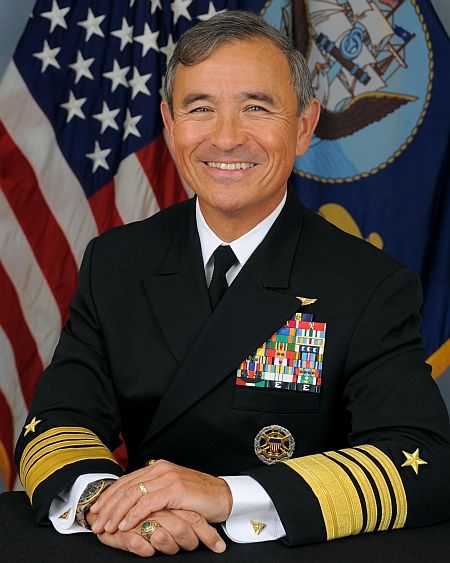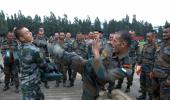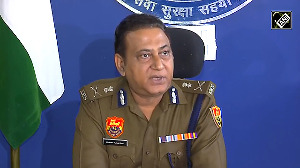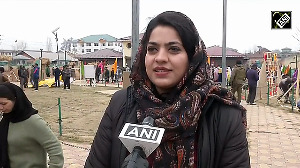 US admiral's suggestion for a revival of strategic maritime quadrilateral with Japan, Australia and India leaves China livid, says Rajeev Sharma.
US admiral's suggestion for a revival of strategic maritime quadrilateral with Japan, Australia and India leaves China livid, says Rajeev Sharma.
Admiral Harry Harris, who heads the United States Pacific Command, praised India sky high and threw barbs at China in his speech on Wednesday, March 2, at the Raisina Dialogue jointly organised in New Delhi by the Observer Research Foundation and the ministry of external affairs.
Admiral Harris went one step further to rile China by strongly pitching for initiating a quadrilateral security dialogue involving the US, Japan, Australia and India -- a loose grouping that was in existence for a brief while but was aborted about a decade ago because of immense pressure by China on Australia.
Admiral Harris is the first Asian American to achieve the rank of admiral, the highest ranking Japanese American, and the first officer from the US Navy's P-3 maritime patrol aviation community to achieve 4-star rank and given these solid credentials his policy recommendations cannot be taken lightly by anyone.
The top American soldier's pitch for the four countries forging closer maritime operation has come a few months after India hosted Japan and Australia for its first-ever high-level trilateral dialogue in New Delhi.
Apart from issues of maritime security, freedom of navigation patrols and trilateral cooperation in the Indian and Pacific Oceans, the three countries' top diplomats had also discussed revival of the Strategic Quadrilateral. Interestingly, this time, Australia is very keen on the entity's revival.
Admiral Harris batted for the Strategic Quadrilateral thus: 'An idea to consider is perhaps expanding this tri-lateral to a quadrilateral venue between India-Japan-Australia and the United States.'
He expanded his thought by saying: 'India's historical and cultural influence extends from Southeast Asia to Mongolia and from Indonesia to the steppes of Central Asia -- and to the United States where approximately 3.5 million Americans of Indian descent live and thrive.'
He explained why he uses the term 'Indo-Asia-Pacific' rather than the commonly used 'Asia Pacific,' saying that the Indian and Pacific Oceans are the economic lifeblood that links India, Australia, Asia, Oceania and the US together.
Look how eloquently Admiral Harris batted for closer India-US strategic ties at China's expense: 'Expanded cooperation with India will not only be the defining partnership for the rebalance, it will arguably be the defining partnership for America in the 21st century. Let's be ambitious together.'
'On the security front,' the admiral said, 'India is beginning to exert its leadership in the Indo-Asia-Pacific. We are ready for you. We need you. Let's be ambitious together.'
Admiral Harris spoke in detail about China's soft underbelly, the South China Sea and underlined the need for Indo-Asia-Pacific nations employing naval forces to ensure the entire region remains secure, stable, and prosperous considering the $5.3 trillion in trade traverses each year from the Indian Ocean and through the South China Sea.
His remark 'India, indeed, stands like a beacon on a hill, building a future on the power of ideas... not on castles of sand that threaten the rules-based architecture that has served us all so very well' is being seen as an attack on China's recent actions of reclaiming islands in the South China Sea for building military facilities there.
Expectedly, China's reaction to Harris-speak was fast and furious. Chinese foreign ministry spokesperson Hong Lei responded to the admiral's remarks in Beijing on Thursday thus: 'We have no objection to relevant countries' normal cooperation, but we believe that relevant cooperation should not be targeted against a third party.'
India-US strategic cooperation has grown manifold since the Narendra Modi government took over in May 2014. Defence Minister Manohar Parrikar returned from a visit to Washington a few weeks ago where an agreement for a series of joint India-US exercises scheduled to take place this year was inked. US Defence Secretary Dr Ashton Carter and his deputy Frank Kendall will visit India next month.
When President Barack Obama visited India in January 2015, India and the US for the first time ever had come up with a separate statement on the South China Sea. Oceans are key to India-US strategic cooperation. Modi has subtly hinted this by noting about India-US synergy that 'our destinies are linked by the currents of the Indian Ocean.'
While intensifying India-US relations is good, India will do well to remember that it must not isolate and infuriate China.
Rajeev Sharma is an independent journalist and a strategic analyst who tweets @Kishkindha.











 © 2025
© 2025